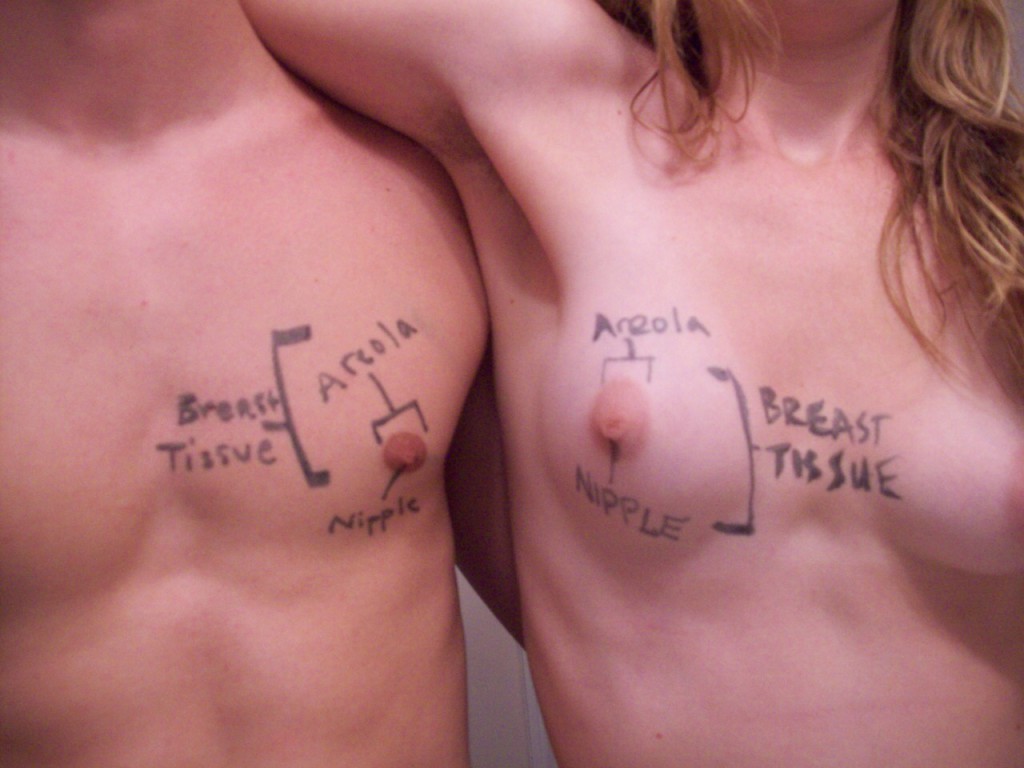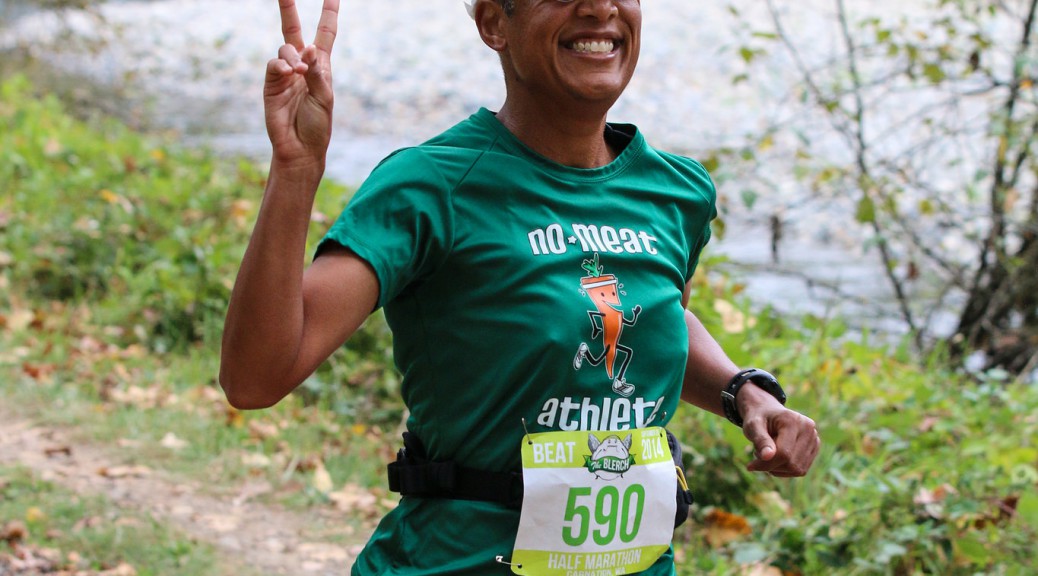[Image: Pax , the author, runs on a trail, grinning and making a “V” sign with their fingers. They are wearing a “no meat athlete” shirt and race bib. Photo by comerphotos.com]
Today marks one year since a San Francisco judge granted my court order to change my name and gender. (Although I’m agender, my sex is male, so I wanted that legally recognized.) I’ve had nearly all of my various identification documents updated now, with the notable exception of my birth certificate, as my home state of Pennsylvania currently requires surgery for that.*
And surgery is something I am not willing to have at this time. When I first contemplated transitioning, I felt that I wanted a hysterectomy and oophorectomy. But after I went on testosterone and my monthly periods finally ceased, I eventually decided I didn’t want to undergo the risk and expense of surgery. As long as I’m not bleeding, I’m not actively thinking about those internal organs.
I would still prefer to have a cis-typical penis instead of a vulva and vagina, but that kind of surgery is really problematic and expensive. Testosterone therapy has helped there too, as my clitoris has grown to the size that I now think of it as a penis, albeit a very small one. I no longer feel the need to get a prosthetic, which is another thing I thought for sure I’d want before going on T. (I did wear a packer at home for awhile, but don’t currently feel the need to do so.)
One of the more disturbing things about my transition is that while my physical dysphoria has decreased significantly thanks to the hormones, my social dysphoria has actually increased. Part of this is due to my breasts. Unlike the vast majority of trans men and nonbinary female-assigned people I’ve encountered, I do not bind and am not seeking top surgery.
I neither love nor hate my breasts, but I do hate the feeling of constriction. After I lost a significant amount of weight a couple years back, I stopped wearing bras, even for running, and it felt great. I felt a little bounce at the beginning of each run, then didn’t notice them anymore.
But I’m sure other people do, as you can see in the featured photo at the top of this post (which this blog theme conveniently cropped to focus on my chest). This was at last September’s Beat the Blerch half-marathon, near Seattle. I was wearing a tank top under that thin shirt, but it was cool out, and I have rather prominent nipples regardless.
So every time I go for a run, I’m convinced that everyone is staring at my chest. This, plus my continued resentment that I can’t run topless without facing additional stares and harassment on top of the misgendering, has resulted in me running less and less frequently since my transition. I ran today for only the second time in a month, and only because I got up early enough to get out by 7 a.m., when there were few people about.
My therapist, who has been listening to me complain about not being able to run topless (safely) since well before my transition, finally said that I can either change the world, or I can change myself. At that point, I was starting to consider top surgery. But I simply do not want to surgically remove parts of my body that I don’t have a problem with.
Having breasts does not make me female or “female-bodied”. Cis men have breasts too, unless they’ve had them surgically removed. Cis men can get breast cancer. Cis men can suffer from gynecomastia, which causes breast enlargement independent of body weight. In fact, some of the most popular binders for trans men were designed for cis men with this condition.
The only difference between my chest and that of a typical cis man’s is the size, shape, and position of my breasts, nipples, and areolae. The “free the nipple” and “top freedom” movements point this out, though they are geared toward cis women, not transmasculine people. The problem with how I’ve seen these important movements marketed is that most of the people pictured are thin, light-skinned, and small-breasted, with small areolae and nipples. Look at this widely-circulated photo for example, which I believe originated on the Instagram page of Cara Delevingne (though it’s not clear if she’s the one in the photo):

[Image: The torsos of two people with words written on them labeling breast tissue, areolae, and nipples.]
Notice in the above photo that both chests are hairless, both have fairly small nipples and areolae, and the person on the right has their arm lifted which makes their breast appear even smaller. A lot of breasts, belonging to both assigned-male and assigned-female people, look nothing like the above. See this gallery of self-submitted, non-sexualized breast photos for example (geared toward cis women; contains cissexist language). Top freedom means freedom for everyone with visible breasts, regardless of their assigned sex or appearance.
Ironically, in many cities, including here in San Francisco, it is legal for women to go topless in public, but few do so. In New York City there’s a co-ed topless book club (some of their photos contain full nudity). I’ve mused about arranging a topless fun run, but the permitting process and security would probably be a nightmare.
So, do I change the world or do I change myself? If I didn’t want to change the world, I wouldn’t have become an animal rights activist, and I certainly wouldn’t have gotten involved with DxE (Edit, Sep 2016: I left DxE a year ago). I’d just be content to be vegan. But this kind of activism – top freedom – has more risk to me personally, and is probably not as important from a global perspective, though it’s something I care about deeply. Regardless, the idea that I should cut off parts of my body that I’m not personally dysphoric about is really unacceptable to me at this stage.
For the time being, I think I’ll just stick to running in the early hours when I’ll encounter fewer people, but I’ll keep my shirt on. For now. Stay tuned…
* Edit, Sept. 2017: Pennsylvania removed the surgery requirement in August 2016.

I don’t think anyone should make you feel forced into any surgery. It’s expensive, painful, and risky. I’ve been very worried about a friend who is recovering from a serious infection following a hysterectomy. Do what feels right to you.
The problem with changing the world is that it takes so long. Take same-sex marriage, it took ~50 years but it is now legal across the US. Not the world, just the US. Uganda keeps trying to make it punishable by death to BE homosexual. There is constant racism towards blacks, and it’s been 50 years since they got their rights. Look at sexism towards women, etc. If you’re willing to fight for the next 50-? years for it, go ahead and change the world. We won’t have animal rights in my lifetime, but could sometime in the future.
Basically, if you want something to happen now, or even sometime soon, you’ll have to change yourself. If you want the global change, it may not happen in your life.
I’m definitely willing to fight for change that won’t happen within my lifetime. If no one in the past had done that, I would likely be a slave or hanging from a tree somewhere instead of living in a decent San Francisco apartment typing these words.
Also, same-sex marriage was legal in a number of countries before the US, but you might have known that already (not sure from the way you worded your comment).